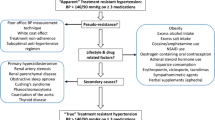Abstract
Treatment-resistant hypertension is associated with an increased risk of cardiovascular morbidity and mortality. Treatment recommendations include a combination of at least three antihypertensive drug classes, including a diuretic. Although there is limited evidence to support selection of add-on therapy, mineralocorticoid receptor antagonists (e.g. spironolactone and eplerenone) can effectively reduce blood pressure when added to standard combination therapy, and should be considered as fourth-line treatment options.
Similar content being viewed by others
References
Chobanian AV, Bakris GL, Black HR, et al. The seventh report of the Joint National Committee on prevention, detection, evaluation and treatment of high blood pressure: the JNC 7 report. JAMA. 2003;289(19):2560–72.
Calhoun DA, Jones D, Textor S, et al. Resistant hypertension: diagnosis, evaluation, and treatment: a scientific statement from the American Heart Association Professional Education Committee of the Council for High Blood Pressure Research. Circulation. 2008;117(25):e510–26.
Vega J, Bisognano JD. The prevalence, incidence, prognosis and associated conditions of resistant hypertension. Semin Nephrol. 2014;34(3):247–56.
Glicklich D, Frishman WH. Drug therapy of apparent treatment-resistant hypertension: focus on mineralocorticoid receptor antagonists. Drugs. 2015;75(5):473–85.
Gaddam KK, Nishizaka MK, Pratt-Ubunama MN, et al. Characterization of resistant hypertension: association between resistant hypertension, aldosterone, and persistent intravascular volume expansion. Arch Intern Med. 2008;168(11):1159–64.
Clark D, Ahmed MI, Calhoun DA. Resistant hypertension and aldosterone: an update. Can J Cardiol. 2012;28(3):318–25.
Vongpatanasin W. Resistant hypertension: a review of diagnosis and management. JAMA. 2014;311(21):2216–24.
Mancia G, Fagard R, Narkiewicz K, et al. 2013 ESH/ESC practice guidelines for the management of arterial hypertension. Blood Press. 2014;23(1):3–16.
James PA, Oparil S, Carter BL, et al. 2014 evidence-based guideline for the management of high blood pressure in adults: report from the panel members appointed to the 8th Joint National Committee (JNC 8). JAMA. 2014;311(5):507–20.
Gorostidi M, de la Sierra A. Combination therapy in hypertension. Adv Ther. 2013;30(4):320–36.
Ernst ME, Lund BC. Renewed interest in chlorthalidone: evidence from the Veterans Health Administration. J Clin Hypertens. 2010;12(12):927–34.
Jamerson K, Weber MA, Bakris GL, et al. Benazepril plus amlodipine or hydrochlorothiazide for hypertension in high-risk patients. N Engl J Med. 2008;359(23):2417–28.
Jansen PM, Danser AH, Imholz BP, et al. Aldosterone-receptor antagonism in hypertension. J Hypertens. 2009;27(4):680–91.
Kasama S, Toyama T, Kumakura H, et al. Effect of spironolactone on cardiac sympathetic nerve activity and left ventricular remodeling in patients with dilated cardiomyopathy. J Am Coll Cardiol. 2003;41(4):574–81.
Hirsch JS, Drexler Y, Bomback AS. Aldosterone blockade in chronic kidney disease. Semin Nephrol. 2014;34(3):307–22.
Gaddam K, Pimenta E, Thomas SJ, et al. Spironolactone reduces severity of obstructive sleep apnea in patients with resistant hypertension: a preliminary report. J Hum Hypertens. 2010;24(8):532–7.
Chapman N, Dobson J, Wilson S, et al. Effect of spironolactone on blood pressure in subjects with resistant hypertension. Hypertension. 2007;49(4):839–45.
Václavík J, Sedlák R, Plachy M, et al. Addition of spironolactone in patients with resistant arterial hypertension (ASPIRANT): a randomized, double-blind, placebo-controlled trial. Hypertension. 2011;57(6):1069–75.
Abolghasmi R, Taziki O. Efficacy of low dose spironolactone in chronic kidney disease with resistant hypertension. Saudi J Kidney Dis Transplant. 2011;22(1):75–8.
Oxlund CS, Henriksen JE, Tarnow L, et al. Low dose spironolactone reduces blood pressure in patients with resistant hypertension and type 2 diabetes mellitus: a double blind randomized clinical trial. J Hypertens. 2013;31(10):2094–102.
Karns AD, Bral JM, Hartman D, et al. Study of aldosterone synthase inhibition as an add-on therapy in resistant hypertension. J Clin Hypertens. 2013;15(3):186–92.
Yoshitomi Y, Kawanishi K-I, Yamaguchi A, et al. Effectiveness of the direct renin inhibitor, aliskiren, in patients with resistant hypertension. Int Heart J. 2013;54(2):88–92.
Harel Z, Gilbert C, Wald R, et al. The effect of combination treatment with aliskiren and blockers of the renin-angiotensin system on hyperkalaemia and acute kidney injury: systematic review and meta-analysis. BMJ. 2012;344:e42.
Robles NR, Cerezo I, Hernandez-Gallego R. Renin-angiotensin system blocking drugs. J Cardiovasc Pharmacol Ther. 2014;19(1):14–33.
Amar L, Azizi M, Menard J, et al. Aldosterone synthase inhibition with LCI699: a proof-of-concept study in patients with primary aldosteronism. Hypertension. 2010;56(5):831–8.
Calhoun DA, White WB, Krum H, et al. Effects of a novel aldosterone synthase inhibitor for treatment of primary hypertension: results of a randomized, double-blind, placebo- and active-controlled phase 2 trial. Circulation. 2011;124(18):1945–55.
Monge M, Lorthioir A, Bobrie G, et al. New drug therapies interfering with the renin-angiotensin-aldosterone system for resistant hypertension. J Renin Angiotensin Aldosterone Syst. 2013;14(4):285–9.
Bhatt DL, Kandzari DE, O’Neill WW, et al. A controlled trial of renal denervation for resistant hypertension. N Engl J Med. 2014;370(15):1393–401.
Author information
Authors and Affiliations
Consortia
Ethics declarations
Disclosure
This article was adapted from Drugs 2015;75(5):473–85 [4] by salaried employees of Adis/Springer and was not supported by any external funding.
Rights and permissions
About this article
Cite this article
Adis Medical Writers. Consider mineralocorticoid receptor antagonists as add-on therapy in treatment-resistant hypertension. Drugs Ther Perspect 31, 345–349 (2015). https://doi.org/10.1007/s40267-015-0229-6
Published:
Issue Date:
DOI: https://doi.org/10.1007/s40267-015-0229-6




